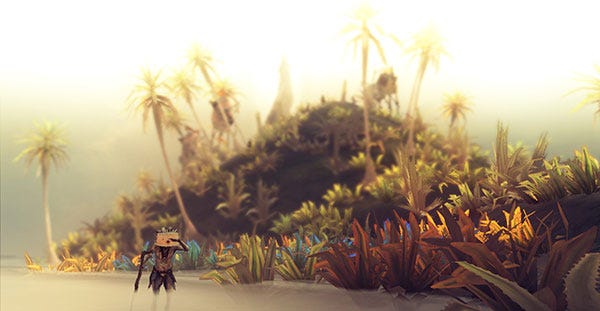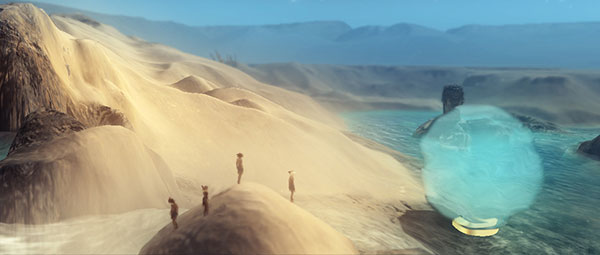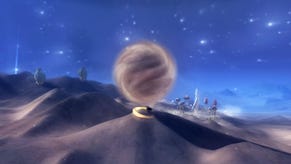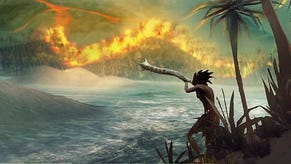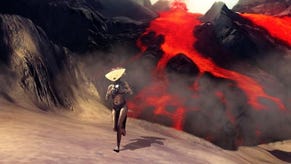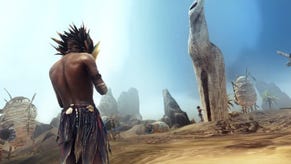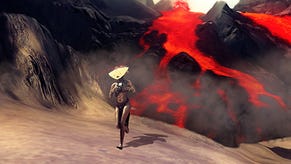Impressions: From Dust
River deep, mountain high
With the PC version of Eric Chahi's god-game delayed by a few weeks, I've opted to sully my body and mind with the now-out Xbox version in order to get a sense of what we're in for. I promise I washed my hands afterwards. I can't tell you anything about the PC take on From Dust's performance or controls or DRM, and nor can I until I've spent good hours with that version, but I can give you a sense of how it plays presuming it's broadly unchanged from its console cousin.
I'm apparently just over halfway into the story mode (the only other option is 'Challenge', which I've not explored yet - there isn't a dedicated sandbox mode, unless it's unlocked at the end of the game), but the game's tendency to introduce new abilities and challenges every level means I'm quite sure I haven't seen all its mechanics as yet. Who knows what landscaping surprises remain up From Dust's sleeve? At this point, though, I'm trying to reconcile the idea of a highly flexible game of terraforming and omnipotence the trailers had seemed to sell me with the reality of From Dust. That reality is closer to a puzzle game with fairly pre-determined answers, but the option to wander off and experiment with the minutiae of terraforming, rather than unleash its bigger picture.
Fundamentally, it's a game about earth-moving - dumping clumps of earth to build ridges and hills, or hoover away parts of the ground then fill them with water to form lakes. Only in selected areas, mind, and random landscaping won't achieve your objectives. These objectives aren't urgent, with the game largely happy to let you play at your own pace, but they are specific if you want to reach the next level, and the powers and challenges it's likely to contain. The challenges also demonstrate how limited your powers are. Turns out you're more a demi-god, or perhaps some kind of divine janitor, than a god-god. There's not a lot you can do about oceans or mountains, and in fact it's only the fast-cooling lava that's offered me a truly profound degree of terraforming so far - even then, only one level as yet has included it.
Instead, you're called upon for tasks such as constructing specific pathways across lakes your tribespeople must cross or coax water over to a desert to help palm trees grow. Puzzles must be solved in broadly the way it wants you to solve its puzzles. Lateral thinking won't beat them. At times, this inflexibility can grate, but to its great credit From Dust is careful to adjust its parameters each level. On one map, water is your friend, your defence against raging fires. On the next, it might your worst nightmare, drowning village after village. Without ever actually breaking its own rules, From Dust is supremely clever at mixing its few but strong elements up.
What isn't there, not truly, is the freedom to be a divine psychopath. Dammit, I want to unleash collossal disaster, not just instantly drown a village of five near-silent men! I want to remake the world in my image! Literally my image - I want my followers worshipping around my great rock nose, seas swirling inside my monstrous eye sockets, flame belching from my titanic mouth...
...I want a different, or at least more dramatic game to the one that is in front of me, which means I'm offering absolutely worthless criticism when I call for those things. I suspect I won't be alone, of course, From Dust may well prove a victim of its players' expectations - because it's made by the guy who made the revered Another World, because it appeared to be the long awaited return of god games in the Populous vein and, frankly, because the likes of Minecraft, Terraria and Wurm Online mean we're starting to become rather accustomed to extraordinary degrees of sandbox construction/destruction freedom. On console, that might not be so much of a problem for From Dust, and indeed it's rather more likely to stand out as something bold and alternative amongst all those action games and retro remakes. On PC... well, we're well aware of both the past and present of world-shaping games. Poor old From Dust, gentle thing that it is, has so much to live up to. For that reason, try to go in with a mind more open than yours might be inclining towards. You'll get much more from the game if you do.
Because From Dust does offer wonder, and a more gentle kind of omnipotence. While the key-in-lock nature of level progression in what I've played so far - reach every pre-set totem on the map, found and maintain a village at each, then an exit unlocks - is a bit of a let-down, there is nothing to stop you ignoring the objective and indulging yourself with a little quiet design and speculative experimentation. You'll rarely have vast amounts space to play with, but you do have water physics, and that alone achieves far more than space could. A small pile of earth in the right - or wrong - place can have immediate and dramatic effects, turning a stream into a river, a valley into a lake, a spring into a waterfall, a beach into an estuary or series of tree-flocked peninsulas, a happy village into a drowned nightmare. Right now, I'm playing to get through, but I know I'm going to come back simply to indulge myself, to endlessly answer the never-closing question that is 'what happens if I do this?'
The spells offer even more answers to this question, though their primary purpose is to best the puzzles. The basic mechanic is suck up and spit out earth, water or occasionally lava, but slowly the game introduces more specific and outlandish powers. The one that temporarily turns water into a jelly-like substance is an esoteric treat that lets you temporarily sculpt fluid into towers and valleys, as well as being a life-saver should you be met with an oncoming tidal wave. I've just been introduced to a vortex of destruction that permanently removes whatever matter I hoover up, rather than merely relocating it, and I'm crossing my gnarled fingers that the inverse - a matter creation spell - awaits me later. Then it's on. Then it's on. Other spells, such as Evaporate or Extinguish Fire do speak to the fixed and often timing-based nature of the puzzles, however - they're clearly there only as solution, not as world-shaping tool.
When you do turn to beating the puzzles - and on some maps, scripted, looped disasters mean you pretty much have to get right on with it - you'll feel assaulted, cornered and fighting for your life. Except there are no enemies as such in From Dust. Your foe is simply implacable nature - sometimes manifesting as simply and understandably as the disastrously changed course of a river in response to your digging, but on the least likeable levels nature all too clearly is a machine. The oceans rise on a timer every two minutes, or fire-trees cyclicly set alight anything within range. The mood turns frantic, and the last thing you'll feel like is a god. Quick thinking plus defence on multiple fronts is increasingly required to survive.
For all the dreamy aesthetics, it's not an unfocused game, nor is it as quiet as all that rock and water suggests. Even when you're just indulging in some ambient noodling, and even though your followers aren't anything more than a handful of automated couriers you cannot interact with directly, the game never feels placid, empty or lifeless. It's the undulating, shapeable land, the slowly spreading vegetation and the gentle fire-fighting of nature's tireless onslaught that lends it life, not some little dudes wandering around. They are all but nothing to you. Your interest is the land, not its occupants. Still, I did crave more interaction on that front, some way to have them do more than walk from fixed point A to fixed point B. Animals also turn up if you sprinkle earth and water around in such a way that palm forests spread - that extra visible movement, that sense of building a better world, of having succeeded in bringing life to the wasteland, is more akin to the game I'd imagined From Dust to be, but these abstract beasts aren't anything more than ambulatory scenery.
So it's not the grand god-game I thought it was from the trailer, it's not the Populous sequel we've waited so long for and it's certainly not another Another World - at least, not yet. I hear tantalising talk the last level finally opens up its sandbox veins fully, which is something I shall absolutely persevere for. It is often, however, a pleasant waking dream of a game, and one that rewards the careful observer, thoughtful designer and measured experimenter far more than it does the wannabe old testament deity. It is much smaller in scope and less dramatic than perhaps I'd hoped, but from what I've seen it is a game whose existence I entirely welcome and from which I expect to derive far more than my so far rather superficial experiments have yielded.
I'm also very keen to see how it looks and feels on PC. There's a muddiness to the 720p 360 version and the relative crudity of a gamepad doesn't allow me to swoon and sway the camera as I'd like, to admire my creation and destruction from quite the right angles. Its dusty yet water-locked environments and abstract, distorted organic denizens could well become truly beautiful on a crisper display. So, more soon.
